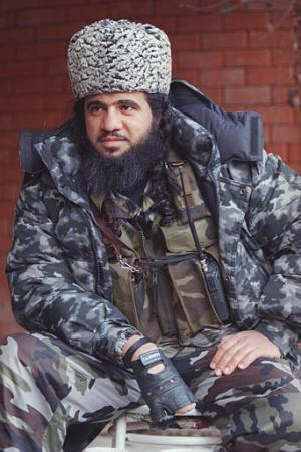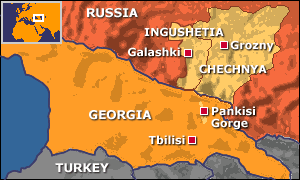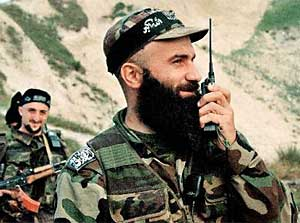
As it pertains to the initial part of the quote from Jane’s timeline, the following is interesting information. Dated the same year (’00) from GlobalSecurity.org: “The road linking Georgia with Russia's breakaway Chechnya region is little more than a dirt track snaking along the floor of the Argun River canyon. It takes a sturdy four-wheel drive vehicle to ford the stream as it rushes past Shatili, a tiny settlement two kilometers from the international boundary.” [444] How could Maskhadov disclose that thousands of mercenaries were on their way, via the only route through Georgia requiring surveillance without jeopardizing their safe passage? Already established is that Georgian authorities secured trans-ship’ment routes for drugs and weapons. So where were the Russians? It may be interesting to learn just who was out there making the road passable. Paul Quinn-Judge reported in Oct. of ’02: “Some Chechen commanders were reportedly unwilling to become involved in the al-Qaeda plans to strike Western targets in Russia, arguing that this was not their war. But there was never an open rift: they received money and other help from the Arabs...” [445] “Some” implies that there were others, the criminal warlords no doubt, who would. In November of ’02 separatist leaders held a meeting that led to Maskhadov’s resignation as president. “At the meeting Maskhadov was appointed the 'high emir of the mujaheddin' in Chechnya, which denies him the status of 'president.' Shamil Basayev was made the military leader of the high emirate,' said Mr Suleimenov.” [446] “In 2003, the press-service of Chechen rebel leader Aslan Maskhadov released a videotape that… shows a meeting of the top Chechen rebel commanders, including Maskhadov, Basayev, Doku Umarov and others, which took place in the mountains in March... The voiced-over commentary on the tape says, “different issues of the continuing war against Russia are on the agenda, including the issue of committing acts of sabotage on the enemy ’s territory.” On February 18 [‘04], two gas pipelines were blown up in …Moscow…” [447]
Reportedly, the Russian Ministry of Defense also made public photos dated 2002 that prove the connection between Maskhadov, Basayev and other Chechen warlords with representatives of international terrorist organizations. From the International Relations Center (IRC): “Within the rebel movement, Maskhadov represented the nationalistic side; while Basayev represented the extremist, Wahhabist faction. Regardless of these distinctions, the rebel forces generally responded to both of these leaders…” [448] In June of ’05 RFE/RL’s Andrei Babitsky conducted an interview with field commander Doku Umarov. Babitsky states that while whatever internal conflict there was between the factions no longer exist, he contends that it’s “a new situation” that’s emerging. “While previously Wahhabis formed separate detachments and fought separately from Chechens who practice traditional confessions, now they are all mixed together.” He further states that Umarov considers commander Shamil Basayev a comrade in arms, “just as Maskhadov did.” Babitsky also adds that Basayev “…occupies an official post in the leadership of the Chechen resistance…” [449] Arguably there is a reasonable distinction between indiscriminately killing civilians with terrorist attacks and collateral damage resulting from “guerrilla war” tactics and “acts of sabotage.” The problem is Maskhadov is constantly found aligned with the radical fringe. Recall that as commander he had foreknowledge of Basayev’s operations.
The following material briefly explores the separatists’ regional & international connections, pertaining to recruitment & training. In February of ’02, citing a Russian Intelligence spokesman, Fred Weir reported that from wire intercepts conducted by the FSB, Al-Khattab had “…Chechen rebel operatives working in Saudi Arabia and other Arab countries. … Chechen warlords, including the Arab-born al-Khattab, began to integrate their private armies with the global Islamic terror network…” [450]  In March of ’02 L.A. Times staff writer Robyn Dixon reported: “A Chechen security official in Tbilisi representing the separatist Chechen leader, Aslan Maskhadov, said he had met two Arab fighters [from UAE]…in the city two weeks earlier. They had intended to go to Chechnya to fight but were afraid because of reports that the U.S. was planning to assist Georgia in clearing the Pankisi Gorge.” This “security official” operating in the capital of Georgia insisted that the “…people who are helping us have no links to Bin Laden or Al Qaeda." [451] Right, of course that’s why they’re referred to as recruits. From the previously cited Quinn-Judge article: “…a university student from Istanbul who had volunteered to fight for the Chechen cause was approached in the market [apparently the Duisi village, Georgia] … by an Arab man (Abu Yasim).” Quinn adds that Yasim, who was western-educated (U.K), had been apprehended, was in U.S. custody and believed to be in Guantanamo along with 14 other Pankisi-based operatives. [452] Ibn al-Khattab is profiled to the right. Appears as though he has a handy little transceiver there in his coat pocket.
In March of ’02 L.A. Times staff writer Robyn Dixon reported: “A Chechen security official in Tbilisi representing the separatist Chechen leader, Aslan Maskhadov, said he had met two Arab fighters [from UAE]…in the city two weeks earlier. They had intended to go to Chechnya to fight but were afraid because of reports that the U.S. was planning to assist Georgia in clearing the Pankisi Gorge.” This “security official” operating in the capital of Georgia insisted that the “…people who are helping us have no links to Bin Laden or Al Qaeda." [451] Right, of course that’s why they’re referred to as recruits. From the previously cited Quinn-Judge article: “…a university student from Istanbul who had volunteered to fight for the Chechen cause was approached in the market [apparently the Duisi village, Georgia] … by an Arab man (Abu Yasim).” Quinn adds that Yasim, who was western-educated (U.K), had been apprehended, was in U.S. custody and believed to be in Guantanamo along with 14 other Pankisi-based operatives. [452] Ibn al-Khattab is profiled to the right. Appears as though he has a handy little transceiver there in his coat pocket.
Quinn-Judge cites other accomplishments in the Pankisi resulting from American & Georgian cooperation. More regarding this joint venture is further into the compilation. Yuri Nazarkin: ”Militants had been trained in guerrilla warfare in special camps in Chechnya (in Vedeno, Serzhen-Yurt and Nozhai-Yurt) in preparation for a “jihad” (holy war). The operation was lavishly financed by some international extremist Islamic organisations (…), by Usama bin Laden, as well as by Chechen criminal gangs operating in Russia.” Dated October of ’05, St. Pete Times’ writer Simon Saradzhyan provides excellent insight regarding the background of an extremist group named “Yarmuk”, that was formed in 2002. Saradzhyan states that this cell “…coordinates it actions with Shamil Basayev…Yarmuk comprises the Kabardino-Balkaria part of the North Caucasus network of Islamic militants… In the past year, networks of insurgents and terrorists have staged almost daily, smaller-scale attacks on police and other officials in Dagestan, Ingushetia, Chechnya and other ethnic republics of the North Caucasus.” When the legally registered, more moderate Islamic organization “Jamaat” was forced underground, former members migrated to fight in the second Chechen war. They “…reportedly trained in late Chechen warlord Ruslan Gelayev’s camp in Georgia’s Pankisi Gorge and then formed the Yarmuk organization in 2002, according to Kabardino-Balkaria’s Interior Ministry.” [453] According to Russian sources, Gelayev, who has several criminal convictions on his record in Moscow, “…once served as defense minister and deputy prime minister in the government of Chechen rebel leader Aslan Maskhadov.” [454] The CIDCM timeline corroborates this, stating that “ex-field commander Ruslan Gelayev was given the defense portfolio” in the newly formed government (’98). Further into the compilation is more on several Chechen warlords and within the rebel ranks, a suspected CIA operative. 
To the matter of monitoring the Chechen rebels, the main issue here is why didn’t the FSB make greater use of surveillance techniques. Recall that Russian Intel dialed into Dudayev’s location via his satphone, killing him with a missile strike. Were separatist commanders and collaborating warlords able to address this vulnerability? The sources cited suggest that by the time Russia invaded in ‘94 the rebels had exceptional equipment, though they were using known frequency bands. Given the diverse makeup of the separatist forces, without the use of an encryption system developed by resistance operatives themselves, it seems impossible that the rebels could communicate without their transmissions being intercepted by the FSB. Besides the ability of intercepting and dialing into specific targets, Russian intelligence was also capable of jamming communications in suspected areas. This first source (’97) from globalsecurity.org is interesting. Here, in a document pertaining to the first Chechen war, Timothy L. Thomas states that the Russian military didn’t fully utilize their technological advantage and that Dudayev had “covert agents” providing critical intelligence. “…one recommendation early in the conflict called for dramatically increasing the role of electronic warfare (EW) units and creating a total information vacuum around Chechnya. Another called for the use of portable jammers near guerrilla bases and the suppression of satellite communication channels. Commanders were urged to train, equip, and air-drop raiding and reconnaissance parties into the rear of the Chechens to disrupt lines of communications… Dudayev’s personnel…made good use of communications and intelligence from covert agents. As one pilot noted, “One had the feeling that they knew a great deal. And how many times did it happen where the appearance of helicopters in a particular area was no surprise to the enemy?” Recommendations and commanders insisted upon to make use of proven technology that would obviously be part of any pre-war planning phase implies a level of incompetence too egregious to believe. Contributing to the high civilian casualty rate, Thomas adds: “…ground offensives occurred without preliminary processing of the targets of attack from the air. As a result, the civilian-to-“rebel” death ratio was nearly eight to one, according to former Security Council chief Alexander Lebed.” [455]
On the AFCEA website (Armed Forces Communications and Electronics Association), is an article written by Robert K. Ackerman stating that the Chechens were utilizing “advanced commercial communications systems” while the Russian were using antiquated, proprietary military technology. Ackerman’s article then repeatedly implies that Chechen forces were running circles around the Russian military during the first confrontation that began in ’94. Citing U.S. Marine Corp analysts, the rebel commanders “…were able to listen to Russian messages and transmit misleading instructions that redirected Russian artillery and aircraft missions. … Russian forces…were subjected to massive onslaughts of disinformation. … Russian units "were almost frozen" by confusion sowed in part by the Chechens. In one case in 1996, Chechens broadcast fake radio traffic from imaginary units in the clear for the Russians to deliberately hear.” Ackerman’s sources (Arthur L. Speyer III, Europe/Eurasia analyst with the Marine Corps & David Dilegge, a Marine Corps urban operations analyst) corroborate the incompetence of the Russian military referenced by Thomas. “Speyer explains that the Russians were sloppy in talking in the open on their communications systems. … Dilegge adds that Russian forces ignored many other basic communications security procedures. … The Russians were also handicapped by their failure to employ reconnaissance assets to support ground units… Chechen officials claim that they could intercept Russian tactical communications on their own commercial off-the-shelf radios. … The Chechens also had six large Motorola base relay stations, which they placed on the high ground. The Russians could see the sites and their antennas during the day, but they only risked attacking them at night. By then, Chechen forces would have moved the sites.” [456] The Russian military wouldn't transmit known coordinates triggering a synchronized missle strike destroying the repeaters because it was too risky? That seems rather ridiculous.
Already cited from Fred Weir’s article (’02) was that FSB security services had “…intercepted satellite phone conversations - in Arabic - between al-Khattab…” and other Chechen operatives based in the Middle East. Weir also states, “the transcript [from translated recordings] also reveals al-Khattab's fears about using his satellite phone - an understandable concern, given Mr. Dudayev's fate.” It’s interesting given the known risks of using monitored channels that the FSB didn’t have to crack an encryption code; all that was required was a language translator. Ironically, “…Khattab was killed, reportedly by a poisoned letter, in 2002.” [457] While Ackerman’s contentions are ridiculous his sources provide excellent insight. Quote: “By adding a few simple code phrases, the rebels could communicate in the open without fear of interception…” Again, there’s no sign of encryption. Ackerman’s contention however, is that it wasn’t necessary. The premise being that “…almost no Russians speak Chechen,” comparing the challenge to interpret the language with that of the “code talkers” of Native American descent. From a U.S. military link: “To confound the enemy, American forces in both World Wars used Indian personnel and their unique languages to insure secure communications. In World War I in France, the 142nd Infantry Regiment had a company of Indians who spoke 26 different languages or dialects…” [458] Ackerman mentions the Navajo (predominant in the pacific theatre), which was “…virtually an unwritten language in 1942.” [459] 
Having been foreign cultures from other parts of the world it’s understandable that the Japanese and Europeans had no idea how to crack the “code talkers.” Chechnya, a republic of the former Soviet Union, occupied by Russia forever, governed by Chechen speaking stooges serving the interests of the Kremlin, is an absurd comparison. No matter how unique the Chechen language (less than 3,000 words and “many borrowings” from other languages, namely Russian), Chechen authorities recognized by Moscow would’ve certainly provided the means to interpret “a few simple code phrases.” Another major flaw in Ackerman’s premise is that when Chechen forces wanted secure transmissions they added these code phrases, which they apparently would not include or make easily discernible when they wanted to divert Russian forces from posing any threat. How long before Russian Intel figured out that the messaging they easily understood was disinformation? All that’s needed now is to discover that the rebels spoke Chechen to send secure transmissions and spoke Russian to rouse whole battalions to shoot at each other. Its amazing that the Chechen forces, a group comprised of fighters from many different muslim nations, had no such language restrictions worthy of mention. From RFE/RL’s previously cited interview with Doku Umarov (’05): “Chechens in the mountains don't use mobile communications, or they use them only in extreme situations, although everyone carries a phone. As soon as they get into the forest, they pull out the batteries because they believe that even a phone that has been turned off can be listened in on and located.” In Oct. of ’04 Quinn-Judge wrote a very interesting article about Shamil Basayev, which seems to contradict the previous quote. “Basayev's former neighbors, comrades-in-arms and friends say he hides during the day in the thick, impenetrable forests that carpet the mountains. At night he descends into one of the region's many tiny villages, where he recharges the batteries for his computers and satellite phones…”
Again, the question is whether such measures would consistently ensure secrecy, enabling Basayev and his comrades to exploit a licensed service provider to successfully conduct acts of terror and other nefarious criminal activities without FSB foreknowledge. Citing associates of Basayev, Quinn-Judge then reveals a close link between Basayev & Russian Intelligence. The part that’s disputable is that Basayev remains at large because he has infiltrated and completely compromised the entire regional branch of the FSB. Supposedly, this once CIA, ISI and now FSB asset, has the drop on his former handlers. The interests Basayev’s actions have repeatedly served suggest that nothing has changed. “After Beslan, the Kremlin promised a massive manhunt to track down Shamil Basayev. But Chechnya's terrorist in chief still moves with ease in his home district of Vedeno. … According to Sharip, a Chechen police officer and childhood playmate of Basayev's, "If someone did inform on Shamil, it would be last thing they ever did. The very same person who took the call would phone Basayev straight away." … Basayev maintains his protective bubble through fear, but also by infiltrating the Russian security services. According to Supyan Taramov, a Moscow-based property developer from Vedeno, Basayev has all the Russian military and intelligence installations in the region under surveillance. "Some of his relatives are in the police here, … Basayev's men routinely buy weapons, information and equipment from the Russians — and even get local officials to ferry him around.” [460]